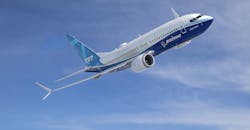U.S. Secretary of Transportation Elaine Chao charged the new chairman of the Federal Aviation Administration to conduct an assessment of that agency in light of two fatal crashes of The Boeing Co.’s 737 MAX jets, and the ongoing effort to correct the software program cited as the cause.
While FAA is overseeing Boeing’s effort to revise and replace the program on dozens of aircraft, critics have questioned how the agency managed to overlook the defects in the testing and certification of the 737 MAX, which happened in 2017.
The new FAA administrator is Stephen Dickson, the former chief of flight operations for Delta Air Lines, in which post he has been criticized for overlooking or dismissing allegations by a pilot that the airline failed to maintain federal aviation safety standards.
The Secretary is committing Dickinson “to assess the performance of the agency and the results of the ongoing investigations to make recommendations about any needed reforms.”
Chao also said Dickson’s arrival “is an important opportunity to take stock of how well the FAA is doing in carrying out its critical safety functions,” according to reports.
Regarding the 737 MAX, Dickson’s position is unchanged from that stated by the former acting FAA chief Dan Elwell, that twin-engine aircraft "will not fly in commercial service until I am completely satisfied that it is safe to do so. FAA is following no timeline in returning the aircraft to service."
The Boeing 737 MAX has been idled worldwide following the crash of an Ethiopian Airlines flight in March, and before that of an October 2018 crash for Indonesia’s Lion Air. Boeing halted assembly and delivery on the aircraft series (for which it has an order backlog of more than 4,600 aircraft), and the Federal Aviation Administration, European Air Safety Administration, and other civil aviation regulators, as well as commercial airlines, have suspended the aircraft from service.
Hundreds of scheduled 737 MAX flights have been cancelled every day through November, and beyond, by U.S. carriers American Airlines, Southwest Airlines, and United Airlines.
Boeing has indicated the crashes were caused by a Maneuvering Characteristics Augmentation System (MCAS), also known as "anti-stall" software, developed to off-set a side-effect of the more fuel-efficient engines adopted for the new version of the 737: because of the engines’ larger size, the planes’ aerodynamic behavior is altered, and the MCAS is meant to counteract a stalling tendency.
Boeing officials estimate the company will complete a further 737 MAX software update by September, after the news that the Federal Aviation Administration has identified an additional programming error to be resolved through the ongoing software update.
It’s been reported recently that FAA prompted a Boeing to alter the planned revision to the flight-control software to fix an error discovered and reported in June, following testing of an earlier software revision. Neither Boeing nor FAA has confirmed the change, which has been reported citing company sources.
“The FAA review and process for returning the 737 MAX to passenger service are designed to result in a thorough and comprehensive assessment,” the OEM stated last month. "Boeing agrees with the FAA's decision and request, and is working on the required software."
